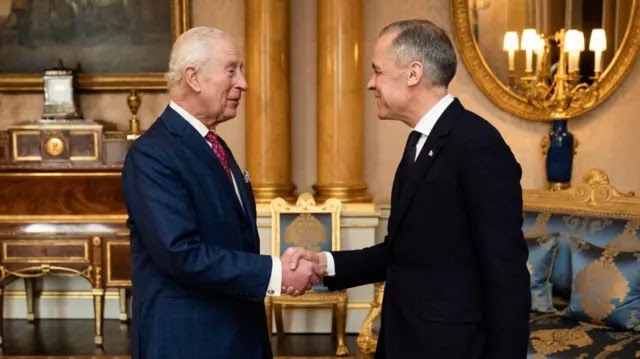AFP/Getty Images
A decade prior, a painting of the British monarch sparked a controversy in Canadian politics. Now, the King is being asked to present the Speech from the Throne. What has changed?
In 2011, soon after establishing a majority Conservative government, Prime Minister Stephen Harper triggered a national outcry by attempting to highlight Canada’s connections to the British monarchy. One instance of this was his decision to replace two artworks by a Quebec artist with a portrait of the Queen.
Many criticized this action as being detached from contemporary values. Over its 157-year history, Canada has gradually pursued greater autonomy from the British monarchy while still being part of the Commonwealth.
When Liberal Prime Minister Justin Trudeau took over from Harper four years afterward, the Queen’s portrait was removed, and the Quebec paintings were reinstated.
Jump to 2025, and an intriguing change has taken place in Canada’s relationship with the Crown. In a clear display of Canada's sovereignty and autonomy in response to threats from US President Donald Trump, Prime Minister Mark Carney - a Liberal - has invited King Charles III to inaugurate the 45th Canadian parliament.
The decision is "a significant endorsement and reflection of Canada's distinctiveness and its traditions," Justin Vovk, a historian on the royal family in Canada, informed the BBC - "a dramatic exhibition intended to highlight what differentiates Canadians from Americans" and not, as Trump has frequently claimed, a "51st state."
Although both nations were once British colonies, the Founding Fathers of America opted for a different course, cutting all formal ties to the Crown nearly 250 years ago.
Canada's departure from the monarchy has been more gradual, with its connections never entirely severed. The parliamentary framework in Canada is inspired by Britain's Westminster model. The British monarch continues to serve as the formal head of state, but most of their responsibilities are carried out by their Canadian representative, known as the governor general.
In the 19th Century, Canada's politicians viewed loyalty to the Crown as crucial for maintaining a difference from the US, according to Canadian royal historian and commentator Carolyn Harris.
This shifted in the 1960s when Quebec - the province in Canada with the largest French-speaking population - began to assert its unique identity, leading to a potential separation. This period saw leaders like Lester B Pearson and Pierre Elliott Trudeau striving to disentangle Canada from its colonial ties to Britain.
In 1982, Prime Minister Pierre Trudeau brought Canada's constitution home, granting full legislative authority to both the federal government and the provinces, thus removing it from the British parliament.
Ms. Harris pointed out that Canada has remained a constitutional monarchy throughout these transitions. However, the extent to which the prime minister of the time chooses to acknowledge that connection has varied.
Carney's invitation to King Charles III indicates that his administration will show significantly more support for the monarchy, according to Mr. Vovk, highlighting "a markedly different attitude" from prior Liberal governments.
A British sovereign has not presented Canada's throne speech since 1977, and has not opened a completely new parliamentary session since 1957, which makes the King's upcoming visit an exceptionally rare event.
This occurs at a pivotal moment for Canada.
Carney made significant efforts in his campaign to confront Trump, following months in which the US president undermined Canada's autonomy by suggesting it would be better off as a state of the US.
Trump also enacted several tariffs that posed threats to Canada's economic stability, considering the US is its predominant trading partner.
When he announced the visit last month, Carney referred to it as "a historic honor that reflects the gravity of our current times."
He emphasized that the King's visit "clearly emphasizes the sovereignty of our nation."
Both historians, Mr. Vovk and Ms. Harris, pointed out that a large portion of Canada's contemporary population is apathetic towards the British monarchy, with some expressing criticisms of it.
The coronation of King Charles III in 2023 prompted renewed examination of the Crown's historic wrongs against Indigenous peoples in Canada, raising questions about whether the new monarch will pursue reconciliation.
Politicians in Quebec continue to advocate for Canada to sever its ties with the monarchy. On Friday, the separatist Bloc Québécois party announced it would again attempt to eliminate the requirement for elected officials to pledge allegiance to the King.
Some Canadians may find the grandeur and spectacle of the King's visit appealing, according to Mr. Vovk, but its primary aim is to convey a political message from Canada to the international community.
It also serves as an opportunity for Prime Minister Carney to enhance relations with Trump, who is well-known for his admiration of the British monarchy and its legacy.
"By fortifying the ties with the monarchy, it lends a stamp of legitimacy that surpasses individual political parties and the current governmental landscape," Mr. Vovk noted. "While politicians may change, the monarchy will always remain."
Additionally, it aims to connect Canada more closely with Europe – a significant goal for Prime Minister Carney, a past governor of the Bank of England, who has emphasized the necessity for Canada to establish new alliances as it adjusts its relationship with the US.
The visit is also significant for the Crown.
This will be the King's first official visit to Canada as the reigning monarch. He and the Queen had planned to visit last year but had to cancel due to his cancer diagnosis.
The palace has pledged that the throne speech will "represent an important occasion between the Head of State and the Canadian populace."
Although it will be a brief trip – the King and Queen will arrive on Monday morning and depart on Tuesday evening – the palace expressed hope that the visit will be "significant."













0 Comments